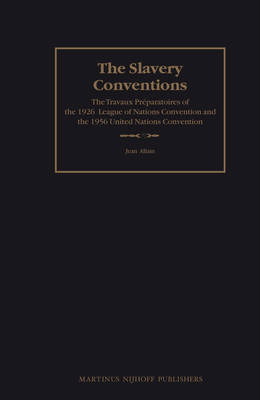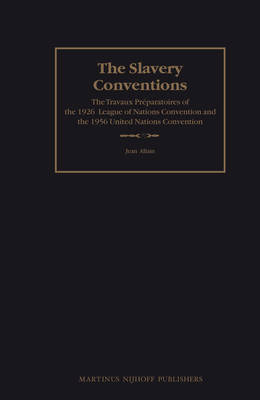
- Afhalen na 1 uur in een winkel met voorraad
- Gratis thuislevering in België vanaf € 30
- Ruim aanbod met 7 miljoen producten
- Afhalen na 1 uur in een winkel met voorraad
- Gratis thuislevering in België vanaf € 30
- Ruim aanbod met 7 miljoen producten
Zoeken
The Slavery Conventions
The Travaux Préparatoires of the 1926 League of Nations Convention and the 1956 United Nations Convention
Jean Allain
€ 520,95
+ 1041 punten
Omschrijving
Slavery has taken on added significance in the twenty-first century as a result of its inclusion in the Statute of the International Criminal Court and it being a component part of the 2001 UN and 2005 Council of Europe conventions against trafficking. With limited and conflicting case-law on the issue, the compiling of the Travaux Préparatoires of the 1926 League of Nations and the 1956 United Nations conventions become essential in seeking to holding States or individuals responsible for violations of international law touching on slavery. The Travaux Préparatoires of the slavery conventions provide insights into the definitions of slavery, the slave trade, and various types of servile statuses while revealing information regarding the various obligations that States have undertaken to suppress the various manifestations of human exploitation.
Specificaties
Betrokkenen
- Auteur(s):
- Uitgeverij:
Inhoud
- Aantal bladzijden:
- 828
- Taal:
- Engels
- Reeks:
- Reeksnummer:
- nr. 1
Eigenschappen
- Productcode (EAN):
- 9789004158610
- Verschijningsdatum:
- 30/06/2008
- Uitvoering:
- Hardcover
- Formaat:
- Genaaid
- Afmetingen:
- 170 mm x 246 mm
- Gewicht:
- 1700 g

Alleen bij Standaard Boekhandel
+ 1041 punten op je klantenkaart van Standaard Boekhandel
Beoordelingen
We publiceren alleen reviews die voldoen aan de voorwaarden voor reviews. Bekijk onze voorwaarden voor reviews.








